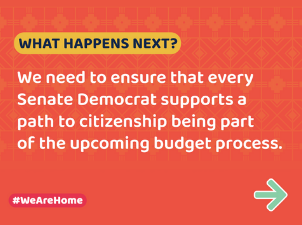
Still Advocating a Pathway to Citizenship
Virginia Schilder
September 22, 2021
Last week, the House Judiciary Committee approved the inclusion of a pathway to citizenship in the upcoming budget reconciliation bill. This pathway would allow an estimated 8 million undocumented neighbors — including Dreamers, Temporary Protected Status (TPS) holders, farmworkers, and other essential workers — to apply for permanent residency in the U.S. Without this pathway, there is no way for those 8 million people, who already live and work in the U.S. under threat of deportation, to change their immigration status.
In order to pass through the budget reconciliation process, the Senate parliamentarian must agree that the immigration provisions have a direct fiscal effect. On Sunday September 19, the parliamentarian rejected Democratic leadership’s initial proposal to include the pathway to citizenship, on the grounds that its impact goes beyond the budget — even though that’s true of everything in the bill! This news is frustrating, but not the end of the line for establishing the pathway to citizenship. As we hope the parliamentarian will realize in the forthcoming meetings, the status of immigrant workers and families is acutely relevant to the budget. Moreover, the Senate (even when it has been Republican-controlled!) has included immigration provisions in the budget reconciliation before.
The COVID-19 public health crisis has made our nation’s reliance on immigrants and their labor even more visible than before. More than 5 million undocumented immigrants have been risking their lives as “essential workers” throughout the pandemic. To call immigrant workers in front-line jobs “essential” to the functioning of the U.S., while failing to provide them with the basic safety and dignity of a secure immigration status, is hypocritical, exploitative, and unjust.
Yet the necessity of creating a pathway to citizenship is about more than labor: it is about human dignity. The millions of undocumented immigrants in our communities have a right to protection not because of their valuable economic contributions, but because of their invaluable humanity. Pope Francis (himself the son of an immigrant) affirmed this in his message for the 2014 World Day of Migrants and Refugees:
“Migrants and refugees are not pawns on the chessboard of humanity. They are children, women, and men who leave or are forced to leave their homes for various reasons, who share a legitimate desire for knowing and having, but above all for being more.”
Catholic teachings have long affirmed the rights of immigrants and refugees and the responsibility of nations like the U.S. to welcome and support them. Pope Francis and the U.S. Bishops, alongside Catholic Sisters and laity in the U.S., have made responding to unjust immigration policies a priority of the 21st century. Our call to protect immigrants and their families draws not only from Church teaching and lived tradition, but also from the myriad scriptural references to the treatment of migrants:
“When a foreigner resides among you in your land, do not mistreat them. The foreigner residing among you must be treated as your native-born” (Leviticus 19:33-34, NIV).
At the core of our faith is the command to love our neighbors as ourselves — and immigrants are our neighbors, integral to the fabric of our communities. Immigrants and their families are made in the image of God, with loves, hopes, and rights, and deserve according treatment. No one should have to live in constant fear of being ripped away from their family, home, job, and community. As human beings, we all have a right to safety, and those with security have a particular obligation to ensure the security of others.
Creating a path to citizenship is a moral imperative, full stop. But passing a budget reconciliation bill that offers a way to citizenship for many immigrants will also boost economic growth, create jobs, and increase wages for all people in the U.S. This makes clear that promoting the good of our immigrant neighbors promotes the good of everyone. Catholic Social Justice, especially the principle of the common good, teaches us that we live in an interconnected society in which individual and communal flourishing are inseparable. Pope Francis expressed this idea directly to U.S. lawmakers during a joint session of Congress in 2015:
“Let us treat others with the same passion and compassion with which we want to be treated. Let us seek for others the same possibilities which we seek for ourselves. Let us help others to grow, as we would like to be helped ourselves. In a word, if we want security, let us give security; if we want life, let us give life; if we want opportunities, let us provide opportunities. The yardstick we use for others will be the yardstick which time will use for us.”
When we treat our immigrant neighbors as human beings with intrinsic and immeasurable dignity — which includes taking structural action to ensure their care and protection — our society becomes more humane for everyone.
After the recent federal district court ruling in Texas threatening DACA, the need to create a path to citizenship is increasingly urgent. Luckily, an overwhelming bipartisan majority of voters — including Independents and Republicans — support Congress creating a pathway to citizenship. What’s more, the budget reconciliation process only requires 50 Senate votes to pass.
NETWORK calls on all Senators to support including a pathway to citizenship in the recovery package. If we are truly committed to protecting workers, families, and those who are most marginalized by our systems and structures, then we must pursue just immigration policies. Including a pathway to citizenship in the budget reconciliation will help ensure that our recovery is equitable and humane. Now is the time to align our policies with our values and enact a path to citizenship.
Read NETWORK’s press release following the release of the Senate Parliamentarian’s initial guidance.







